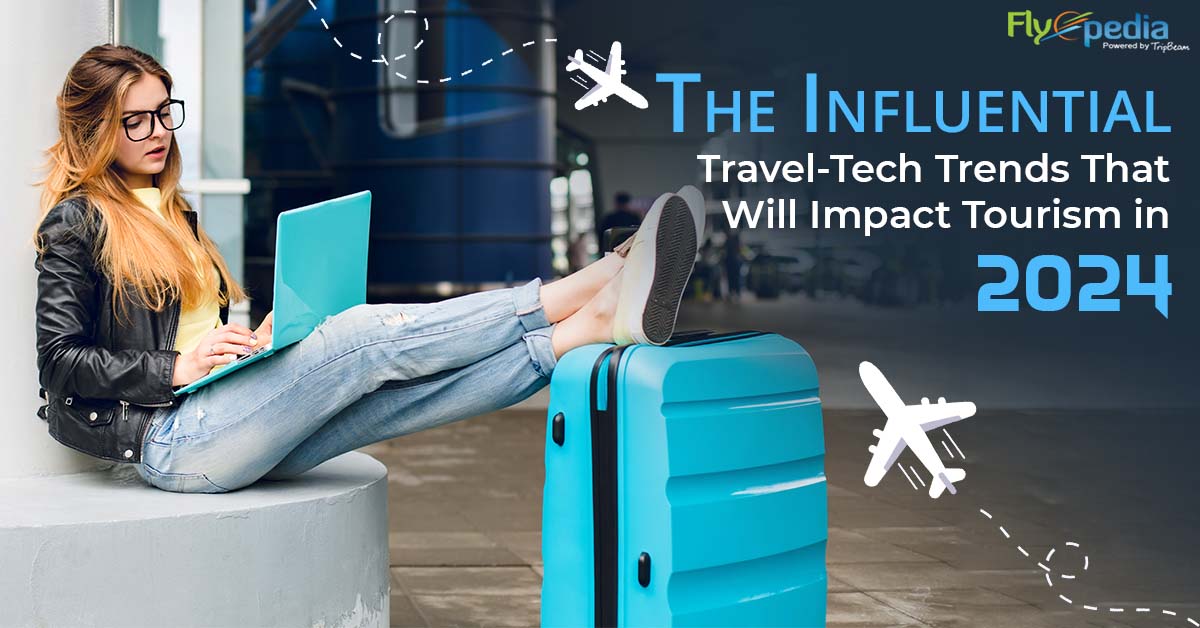Modern technology is advancing so quickly that it is changing every business. Every aspect of travel, including tourism, is deeply rooted in technology. Travelers today cannot imagine their vacation without technology, which aids in everything from itinerary planning and hotel and flight reservations to place investigation and experience enhancement. In this blog post, we’ll delve into the future of travel technology and examine the trends and predictions that will fundamentally alter the way we travel. So, get ready to book flights from YYZ to HYD with Flyopedia and check out these influential travel-tech trends that will impact tourism in 2024.
1. Augmented and Virtual Reality
Virtual and augmented reality (AR and VR) technologies are revolutionizing travel experiences by allowing travelers to experience a destination before they arrive. Through the use of AR and VR, travelers can interact with and discover a variety of locations, panoramas, and landmarks through virtual tours and immersive encounters.
AR and VR may make it easier to book hotels, make reservations for restaurants, spas, and fitness centers, and navigate in real-time and with reliability. Travelers can find fine dining establishments, significant historical events, and authentic local cultural experiences by utilizing this technology. Through effective marketing, it also serves as a tool for hospitality management and raises guest satisfaction. Virtual guides provide directions and suggestions for attractions to see, making it easier for tourists to explore foreign towns.
2. Artificial Intelligence (AI)
Artificial intelligence holds great potential to transform the hotel sector at every stage of the value chain through personalization and attention-grabbing techniques. It also adjusts pricing policies based on seasonal activity projections and follows up with clients during and after their stay.
We are incredibly unpredictable as humans. Many would want to spend their vacations at the same cabin all year round. Some people just want to go to a tough and completely different environment. AI was designed to tackle tasks such as understanding the complexities of current transportation technology developments. It even penetrates the space, transforming it into a sentient being that users can control remotely and that responds to commands. AI has also been used to enhance the travel experience. You can also get cheap flight tickets from the USA to India on Flyopedia.com
Chatbots and virtual assistants utilize natural language processing (NLP), a subfield of artificial intelligence, to provide answers. This can give clients’ questions context, enabling them to offer pertinent guidance. Chatbots and concierge robots, such as the digital concierge at AccorHotels, are speeding up check-in times, offering real-time pricing, and helping with activity recommendations and bookings in the area.
3. Internet of Things (IoT)
Thanks to the Internet of Things, travel agencies can offer a transparent experience to their customers, and anybody involved in the supply chain can participate as well. Imagine a comprehensive vacation package that connects hotels, insurance firms, airlines, and ground transportation to provide the final consumer with a flawless experience. IoT makes the experience more smooth by doing away with the requirement for manual intervention.
Additionally, Beacon-related applications ought to grow. The Beacon is a gadget that can connect to a smartphone and is placed in various locations. For instance, when a visitor arrives and registers at a hotel or museum. Via an app, local businesses in the area will be able to interact with tourists and advertise their goods, deals, and services.
IoT-based travel IT strategies can increase efficiency, productivity, and customer happiness. Furthermore, be sure to check out Flyopedia to book cheap flights from Toronto to Chennai India.
4. Biometrics and Contactless Travel
The travel sector adopted contactless technologies more quickly as a result of the COVID-19 epidemic. Touchless check-ins, digital passports, and contactless payment options are soon to be standard since passenger convenience and security remain top concerns. As the importance of health and safety increases, biometric technology like facial recognition and fingerprint scanning will be used more frequently in travel. These developments will result in a smooth and frictionless travel experience by quickening immigration processes, expediting check-in times, and simplifying security inspections.
5. Big Data
The travel business is trending toward a level of preference and service personalization that makes the client feel as though they are receiving special attention. There are countless big data applications in the travel industry. Customization of offerings is essential for bringing in new or retaining clients. Big data makes it easier to give customers personalized services that take into consideration their location, search history, traffic, cost of travel, and other variables.
For example, travel agencies can plan services and resources by compiling data on client movements. Whether they rent a car or go to duty-free shops. Incorporating credit card information into smart bracelets for convenient shopping or room key replacement is an intriguing way to combine big data with travel technology trends in the future.
6. Voice is the Future Frontier
Communication between computers and people has evolved dramatically, especially since voice technology was developed. As tour operators continue to invest in speech technologies, businesses will have faster access to passenger profiles, real-time warnings, and flight convenience checks in a single, natural language. This suggests that clients and travel consultants can accomplish the same activity by merely speaking, as opposed to going via multiple screens.
Conclusion
Technology’s incorporation into the travel and tourism sector is changing how people travel and interact with destinations. As customers become more reliant on technology, travel agencies must invest in state-of-the-art technology to meet the demands of future travel generations. We are eager to explore what new opportunities technology will present to the travel industry in the years to come. Additionally, if you are looking to book cheap tickets from Toronto to Ahmedabad, make sure to browse Flyopedia, the best online travel website to book cheap flights to India.
Also Read: Flying From Canada To India With Gadgets: Things to Know


